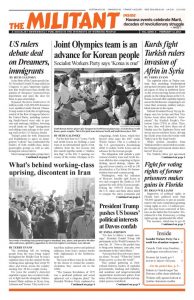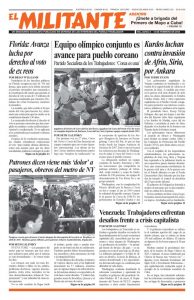In his State of the Union speech Jan. 30, President Donald Trump called on Congress to pass bipartisan legislation that would more than double the number of “dreamers” protected from deportation and open the door for them to gain citizenship.
If passed, the move would cover 1.8 million youth. Only 800,000 dreamers were qualified under Barack Obama. Trump wants to link this to tightening control of the flow of migrant labor to the United States, including restricting family-based visas only to parents and underage children, lowering overall limits on “legal” immigration and adding some mileage to the existing wall on the U.S.-Mexico border.
Trump’s push for both Democrats and Republicans to agree on immigration “reform” has confounded the leaders of both middle-class immigrant-rights groups as well as anti-immigrant conservatives.
Most immigrant rights groups have focused on the dreamers, instead of demanding amnesty for all immigrants. These liberals and middle-class radicals believe that students and college graduates are more deserving of staying in the U.S. than workers. Trump shares this view.
These groups did little when Trump removed Temporary Protected Status from Haitians, Nicaraguans and Salvadorans, who they see overwhelmingly as less-worthy unskilled workers.
Anti-immigrant conservatives are angry because they assumed Trump shared their reactionary all-out pro-deportations agenda. Breitbart News called the president “Amnesty Don.”
The fact is the overwhelming majority of workers who voted for Trump — just like other workers — don’t care about the wall and have no interest in mass deportations of immigrants. What they voted for was to drain the swamp in Washington.
When BBC sent reporters to rural Long Beach in Washington state in January to interview U.S.-born workers there, they expected to find widespread support for recent arrests and deportations of workers without papers who had been living there for years. Trump won a majority of the county in the 2016 election, the first time for a Republican candidate since 1952.
BBC’s reporters were surprised with the results. “These are our friends, these are our neighbors, these are people that we value,” school superintendent Jenny Risner said.
Since taking office the Trump administration has made only minor shifts in U.S. immigration policy. Even those are in continuity with previous administrations — acting to exercise control over the border and the flow of immigrant labor depending on the needs of the capitalist bosses.
After the 2007 financial collapse that shook the United States and the world, the decline in the number of workers without papers crossing the border accelerated because there were fewer jobs. As a result, under the Obama administration the number of deportations declined to the lowest in more than 40 years. At the same time, the number of workers here without papers declined.
“Overall deportations were lower last year than in any year under Obama,” Ioan Grillo wrote in the New York Times Jan. 29. And Mexicans in the U.S. are still sending money home, he said. “In fact, last year is estimated to be a record-breaker for remittances.”
Since Trump’s election, immigration authorities deported 81,000 in 2017, Grillo said. “This number represents more deportations from the interior of the country than in 2016 and 2015, but fewer than every other year of Mr. Obama’s presidency.”
Capitalists need immigrant labor
As the economy has picked up in recent months, bosses have to look harder to find a supply of cheap labor. The number of workers without papers crossing from Mexico has also increased, after a sharp drop in the first months of the Trump administration.
Immigration and Customs Enforcement tries to garner support for deportations by claiming that it focuses on “criminal aliens.” That’s their excuse for attempts since 2006 to deport Ravi Ragbir, executive director of the New Sanctuary Movement in New York City. Ragbir was a permanent resident when he agreed to a plea bargain then on charges of wire fraud. On Jan. 11 he was detained while reporting to ICE for a regular check-in, required while he challenges the deportation order. After protests and a legal challenge, federal Judge Katherine Forrest said his detention was “unnecessarily cruel” and ordered his release Jan. 29. He still faces the possibility of deportation.
Workers’ changing attitudes and the need of the boss class for immigrant labor underscores the growing opportunities to advance the fight for amnesty for all immigrants, a key part of uniting the working class and strengthening the unions.

